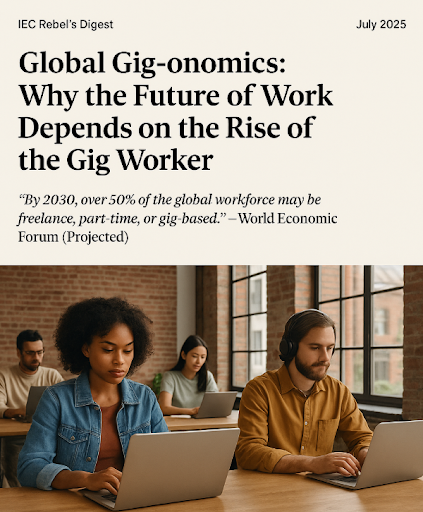Global Gig-onomics – The Future of Work Is Freelance
Executive Summary
 The global workforce is undergoing a seismic shift as gig workers—freelancers, independent contractors, and on-demand professionals—become a core component of business strategy. Once a fringe trend, the gig economy is now a critical engine of labor flexibility, innovation, and global talent access.
The global workforce is undergoing a seismic shift as gig workers—freelancers, independent contractors, and on-demand professionals—become a core component of business strategy. Once a fringe trend, the gig economy is now a critical engine of labor flexibility, innovation, and global talent access.
Driven by digital platforms, generational preferences, and economic pressures, companies are increasingly relying on gig workers for specialized, project-based work. But this transition is not without challenges. Misclassification risks, compliance complexity, cybersecurity concerns, and cultural integration all pose serious hurdles for organizations engaging gig talent at scale.
To succeed in this new landscape, companies must invest in modern infrastructure: robust compliance workflows, secure global payment systems, zero-trust cybersecurity frameworks, and inclusive collaboration tools. Building a dedicated Global Talent Ops function and treating gig workers as strategic contributors—not disposable labor—is essential.
The future of work is borderless, decentralized, and agile. Forward-thinking companies that build scalable, ethical gig ecosystems will gain a powerful competitive edge. Those who fail to adapt risk legal exposure, reputational damage, and missed innovation opportunities. In this new era, agility isn’t optional—it’s the price of entry. Gig work isn’t a side hustle anymore. It’s the future of work.
“By 2030, over 50% of the global workforce may be freelance, part-time, or gig-based.” – World Economic Forum (Projected)
From food couriers in Nairobi to graphic designers in São Paulo, and from AI prompt engineers in Manila to content moderators in Warsaw, the gig worker is no longer a fringe figure in the global workforce. Gig work—once seen as a stepping stone or side hustle—is rapidly morphing into the backbone of the modern labor economy. This is not merely a trend. It’s a revolution.
In this issue of IEC Rebel’s Digest, we dig deep into the future of gig work: what gig workers really are, why their rise is inevitable, what this shift means for companies across the globe, the compliance landmines, and the infrastructure transformation companies must undertake if they want to stay competitive—and legal.
Gig Workers: Who Are They Really?
A “gig worker” is broadly defined as an independent contractor or freelancer who earns income through temporary, flexible jobs—often facilitated by digital platforms. But that label now encompasses a dizzying variety of roles:
- Platform-based labor (e.g., Uber, Glovo, Upwork, Fiverr)
- On-demand professionals (e.g., coders, consultants, marketers, video editors)
- Creative gig workers (e.g., designers, influencers, musicians)
- Task-based workers (e.g., translators, AI trainers, transcriptionists)
- Service-oriented roles (e.g., tutors, wellness coaches, remote virtual assistants)
Importantly, gig work is no longer confined to the “low-skill, low-pay” stereotype. Increasingly, gig workers are highly specialized professionals—often with multiple degrees, bilingual skills, and a track record that rivals full-time corporate veterans.
Why the Gig Economy Is Unstoppable
- Digital Platform Maturity
From remote-first platforms to localized apps, the infrastructure supporting gig work is now borderless. Tools like Deel, Multiplier, and WorkMotion help companies pay and manage freelancers worldwide. Marketplaces like Toptal and Contra connect top-tier professionals to global clients.
- Changing Workforce Values
Gen Z and younger Millennials are choosing freedom, flexibility, and purpose over the rigid 9-to-5. According to a 2025 Gallup study, 62% of Gen Z globally prefer freelance or hybrid work structures.
- Economic Pressures on Employers
Companies facing labor cost inflation, recession fears, and rapid project cycles are pivoting to just-in-time labor strategies. For them, gig work offers scalability without long-term commitments.
- AI Acceleration
As automation expands, many tasks become modular and project-based—perfectly suited for gig execution. AI is not replacing gig workers; it’s enabling more gig work to exist.
- Global Talent Arbitrage
Companies are sourcing gig talent from Africa, LATAM, and Southeast Asia not only because it’s cost-effective, but because it’s better. The talent is skilled, English-speaking, and eager to work remotely.
Challenges for Companies: It’s Not All Sunshine and Slack Channels
- Worker Misclassification = Legal Minefield
The biggest risk companies face when engaging gig workers is misclassification. Simply labeling someone a “contractor” does not make it so. Across jurisdictions, tests vary—economic dependency, managerial control, exclusivity, etc.
- In the U.S., the Department of Labor’s new rules (2024) tilt toward more workers being classified as employees.
- In Germany, gig workers must often be treated as employees unless they pass stringent independence tests.
- In India, the government is moving toward mandatory social security for gig workers.
- In Spain, the “Rider Law” has forced delivery platforms to treat gig workers as employees.
Failing to comply can result in massive fines, retroactive tax obligations, and even criminal liability in some jurisdictions.
📌 IEC Tip: Always conduct a country-specific misclassification risk assessment. “Global templates” don’t work. Local law wins.
- Compliance and Documentation Gaps
Hiring gig workers globally triggers a cascade of compliance obligations:
- Cross-border payments & taxation: Are you withholding the right amount? Is VAT applicable?
- IP transfer: Who owns the work the freelancer creates?
- Data protection: How do you ensure GDPR, LGPD, POPIA, and others are upheld?
- Contracting: Is your independent contractor agreement enforceable in this jurisdiction?
Many companies still rely on DIY spreadsheets and PDF contracts. That’s not just inefficient—it’s dangerous.
- Culture & Management Complexity
Gig workers aren’t just plug-and-play. If they’re ignored or alienated, output suffers. A 2024 McKinsey report found that 57% of gig workers left a client due to lack of communication or unclear expectations.
The Infrastructure Imperative: What Needs to Change
For companies to truly leverage gig workers and stay compliant, they need to invest in infrastructure—legal, digital, operational, and cultural.
- Legal & HR Infrastructure
- Adopt Employer-of-Record (EOR) solutions where local compliance is impossible to handle internally.
- Centralize contracting & classification workflows using platforms like Remote, G-P, or Multiplier.
- Maintain an auditable contractor database with start dates, scope of work, IP clauses, etc.
- Financial Infrastructure
- Use global payroll APIs or contractor payment tools like Deel or Wise Business to handle FX conversions and local compliance.
- Ensure real-time tax reporting capabilities for gig payouts—especially for countries with digital tax filing mandates.
- Cybersecurity Infrastructure
Gig workers often access sensitive systems. Companies must:
- Implement zero-trust architecture and limited-access environments.
- Use identity management platforms to provision/deprovision freelancers instantly.
- Mandate cyber hygiene practices via security training and NDAs.
- Collaboration Infrastructure
Gig workers need to feel included to deliver great work.
- Integrate them into your Slack, Notion, Jira, or Miro ecosystems.
- Schedule weekly syncs and project retros—not just one-off briefings.
- Track deliverables using project-based KPIs, not “time worked.”
Case Studies: Who’s Doing It Right
- Canva (Australia)
Canva employs hundreds of freelance illustrators and copywriters worldwide. Their platform is custom-built to track attribution, pay artists fairly, and integrate them into the brand’s evolution. It’s a textbook case of embedded gig collaboration.
- GitLab (Remote-first)
GitLab is famous for having no central office. With contributors worldwide, it built an extensive remote work playbook and supports flexible project-based work. Their handbook-as-source-of-truth culture makes onboarding and managing global gig workers frictionless.
- Andela (Africa)
Once a bootcamp, Andela is now a talent cloud connecting African engineers with global clients. It handles compliance, vetting, and payroll—effectively serving as a curated gig worker gateway for companies seeking technical talent.
How to Be Future-Ready: 5 Actions for Leadership
- Build a Global Talent Ops Function
This isn’t just a legal issue—it’s a strategic HR one. Establish a Global Talent Ops team responsible for managing the lifecycle of gig workers: onboarding, compliance, payment, retention.
- Redesign Your Org Chart
Stop thinking in terms of “departments” and start thinking in terms of pods, projects, and outcomes. Create org structures where full-time and gig talent can collaborate seamlessly.
- Invest in Smart Vendor Ecosystems
Select tools that integrate: EOR + project management + accounting + security. Look for vendors with API-first architecture to avoid data silos.
- Codify Culture for Freelancers
Culture is not “for employees only.” Create welcome packs, code of conduct guides, and shared rituals that include gig workers. Culture is your IP—spread it generously.
- Develop an Ethical Gig Strategy
Treat gig workers as stakeholders, not disposable labor. Ensure fair pay, respect time zones, offer feedback, and celebrate contributions. That’s how you build loyalty in the new world of work.
The Road Ahead: Work Without Borders
The future of work is not about replacing full-time employees. It’s about expanding the workforce perimeter to include an on-demand, global, decentralized labor force that gives companies the agility they need—and gives workers the freedom they want.
But this new world demands new infrastructure, new leadership mindsets, and new models of trust. The companies that win won’t just “use freelancers.” They’ll build ecosystems where gig workers thrive.
If your HR strategy still revolves around payroll and cubicles, the gig economy will leave you behind.
If instead, you design for flexibility, inclusion, and global access—welcome to the future of work.
📍Rebel Bottom Line
Gig workers aren’t coming—they’re already here. The only question is whether your infrastructure is ready. Rebel companies know: agility is the new currency. And gig workers? They’re your fastest path to it.
IEC Rebel’s Digest— The IEC Group can help you audit your global employment setup by identifying labor leasing risks, verifying licensing requirements, and ensuring your EOR partners meet every compliance standard—before regulators come knocking.
Last but not Least: If you’re facing challenges and wondering how others are managing similar issues, why not join The Leadership Collective Community? It’s a peer group and webcast platform designed for leaders to exchange insights and experiences.
Introducing the IEC Knowledge Network Free Membership – Your Gateway to Seamless Access!
We are thrilled to present a new service that goes beyond the ordinary download experience. In addition to offering you the ability to download the things you love, we are delighted to introduce the IEC Knowledge Network Free Membership.
The Free Membership option grants you access to our library of articles and videos, without the need for tedious registrations for each piece of content.
The publication serves as a trusted resource to support executives in their pursuit of sustainable and successful global expansion. In addition the IEC Practitioners are available to discuss your specific challenge in more detail and to give you clear advise..
Take advantage of this valuable resource to accelerate your global expansion journey


